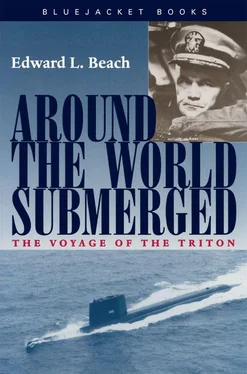It would be unfortunate to be forced to surface and wreck our submerged record, but doing so to enter a foreign port was not to be thought of, unless there were no other alternative. Here was a dilemma!
Fortunately for my peace of mind at that moment, Macon was not due to arrive at Montevideo for a few more days. Besides, Jim Stark had impressed upon me that Poole’s condition, although serious, was still promising. The stone or stones might clear up at any time. We could afford to let events move along at their own speed for a little while longer.
Feeling depressed, I decided that the first of March was certainly not “our day,” and that troubles came in twos. The only cheery note was that both of our problems had a common quality: we could allow them to develop a little farther.
This was a far from satisfactory way to handle either, but it did have the virtue of postponing the real decision.
I think it was about seven o’clock that same night when Jim Stark and Don Fears came to see me together. I immediately sensed that something else was wrong.
Stark spoke first. “You’ll be glad to know that Poole has been asymptomatic for some time now, sir. The morphine is wearing off and he’s up and around. Apparently, he’s in no pain.”
“Good,” I said. “Have you found the stone?”
“No, but that’s not surprising. Sometimes these things are very hard to find.” Jim’s report came in a rush, as though he were anxious to get it over with.
“Well,” I said, unable to shake off the foreboding in my subconscious, “that’s good. What’s the new problem?”
Don deliberately shut the metal door behind the curtained entrance to my room, then, very quietly, informed me that something might be seriously wrong with one of our reactors. So far as Triton and the first of March were concerned, it seemed that troubles were not to be confined to pairs. On that day we were to have them in threes.
Naval reactors, let it be understood, are constructed and inspected with the most extraordinary care. Very precise operating instructions are prepared before anyone is permitted to use them, and the most careful training is given all hands. The remarkable record of dependability which Admiral Rickover’s fantastic new machinery has established is only one of that gentleman’s great gifts to the Navy and our country.
Among the operating instructions are a carefully calculated set of allowed operating parameters. Should any of these parameters be exceeded, there are in addition precise instructions as to what is to be done next. In some cases, all that is necessary is to change certain operating criteria. In others, we are required to shut the reactor down to find out what is wrong and are not permitted to start it again until the difficulty is resolved. In still other situations, there are automatic safety circuits which, when triggered, instantaneously shut the reactor down without further action by any person. This is called a “scram.” It is accompanied by a deafening siren and all sorts of whirring, grinding, and pumping of automatic machinery.
The trouble in our case came under the second heading. Les Kelly had instituted a system to log all the readings on the instruments in the machinery spaces periodically, and then the readings were carefully compared to detect changes. Several of the ship’s officers willingly participated in this check, and it so happened that Jim Stark, in poring over the batch of forms consigned to him, had noticed a slow but steady change in certain entries.
“So, what do you think it is?” I asked.
Jim and Don both started to talk at once.
“Don,” I said.
“Well, I can’t be sure, Captain,” said Don. “But here’s what the book says about it.” He showed me one of the manuals, his finger marking the place.
I read the paragraph carefully. It applied specifically to our situation, described what we were then experiencing, and stated in clear language the several possible causes. Two of the possibilities we could immediately dismiss. Two others, after some discussion, we were satisfied did not apply. But one, very clearly, applied only too well.
My stateroom was barely big enough for the three of us, and our impromptu conference became a rather packed affair when Pat McDonald unceremoniously opened the door and entered. I slid over on the padded bench beneath my folded-up bunk and motioned Stark to sit beside me.
Pat had a slip of paper in his hand. “Here’s a new set of readings, Don,” he said.
I reached for the paper and held it for both Fears and Stark to see. The new figures were not encouraging.
“Well, Pat,” I said. “It’s your reactor. What do you think?”
“We’re still in limits, Captain,” Pat replied, “but I don’t like the way this is moving. Of course, it could be …” Here Pat described an innocuous possible explanation which had occurred to all of us—“but all we can do is keep on checking.”
“Who’s checking?” I inquired. “You’re all in here with me.”
“We’re all into it, Captain,” Don said. “All our reactor technicians, all the officers. Everybody.”
“What do you think?”
“Well,” Don answered reluctantly, “we either have a problem or we don’t. If we do, it’s a lulu. We’ll know for sure in another couple of hours. We’re checking everything, naturally, and I should be able to tell you more pretty soon.”
“All right,” I said, trying to show an assurance I did not feel, “get with it. I don’t want to alarm the troops about this and take their morale down any further, unless we can’t help it. Anyway, it’s not as though there were any danger to personnel. I’ll not come back with you right now, but I’ll join you about the time you have another set of data readings.”
“Right, Captain,” Fears said, as he and Pat rose to leave. “If we go over limits, shall I shut down?”
“Of course. And when you do, say a blessing for Admiral Rickover and the few farsighted officers in the Pentagon who insisted on the development of a multiple reactor plant.”
Jim Stark made a move to follow the two engineers.
“Don’t, Jim,” I said. “One of your duties is radiological safety, you know, and having you be the one who spotted this in the first place is bad enough. If you continue to show interest, the men will think there’s a radiation hazard of some kind. We’ve got enough problems.”
Stark nodded. “You’re right,” he said. “Anyway, I’ve got Poole to worry about. Should check him right now, as a matter of fact.”
It took real will power not to go back into the engineering spaces myself right then, and I knew I shouldn’t be able to wait it out very much longer. Kidney stones, a fathometer that wouldn’t work, and now this—all in a single day! If anything could force us to give up our voyage, this latest difficulty would come closest.
The trouble was, so far, localized in the mechanism of a single reactor, and there was no reason to expect it to appear in the other. Catalogued as an improbable possibility by our manual, this had never happened before in any naval reactor. Could there have been a design error, a weakness undetected in all the testing, something which had at last slipped by Admiral Rickover’s vigilant group? Ergo, might we expect the same problem in the other reactor?
Triton was fortunate in having two. Indeed, it was precisely for this kind of contingency that Rickover had insisted on building her. The Admiral also wanted to amass the practical experience of operating such power plants, which might be installed in future surface ships and later-model submarines. The casualty facing us would have immobilized any other submarine, forced her to surface and radio for help. In our case, it only threatened to slow us down. We could still keep on with our mission, unless, by sad mischance, the investigation now going on would show both reactors to be involved.
Читать дальше












